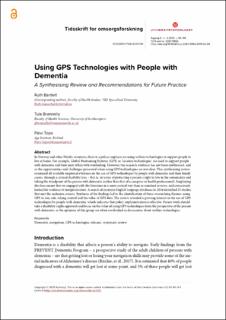| dc.description.abstract | In Norway and other Nordic countries, there is a policy emphasis on using welfare technologies to support people to live at home. For example, Global Positioning Systems (GPS) or ‘location technologies’ are used to support people with dementia and their next of kin with wayfinding. However, the research evidence has not been synthesised, and so the opportunities and challenges presented when using GPS technologies are not clear. This synthesising review examined all available empirical evidence on the use of GPS technologies by people with dementia and their family carers, through a critical disability lens – that is, in terms of protecting a person’s right to live in the community and taking the standpoint of the person with dementia (rather than that of a caregiver or health professional). Employing this lens meant that we engaged with the literature in a more critical way than in standard reviews, and consciously looked for evidence of marginalisation. A search of six major English language databases in 2016 identified 23 studies that met the inclusion criteria. Synthesis of the findings led to the identification of three overarching themes: using GPS to stay safe, taking control and the value of GPS data. The review revealed a growing interest in the use of GPS technologies by people with dementia, which indicates that policy implementation is effective. Future work should take a disability-rights approach and focus on the value of using GPS technologies from the perspective of the person with dementia, as the opinions of this group are often overlooked in discussions about welfare technologies. | en_US |
